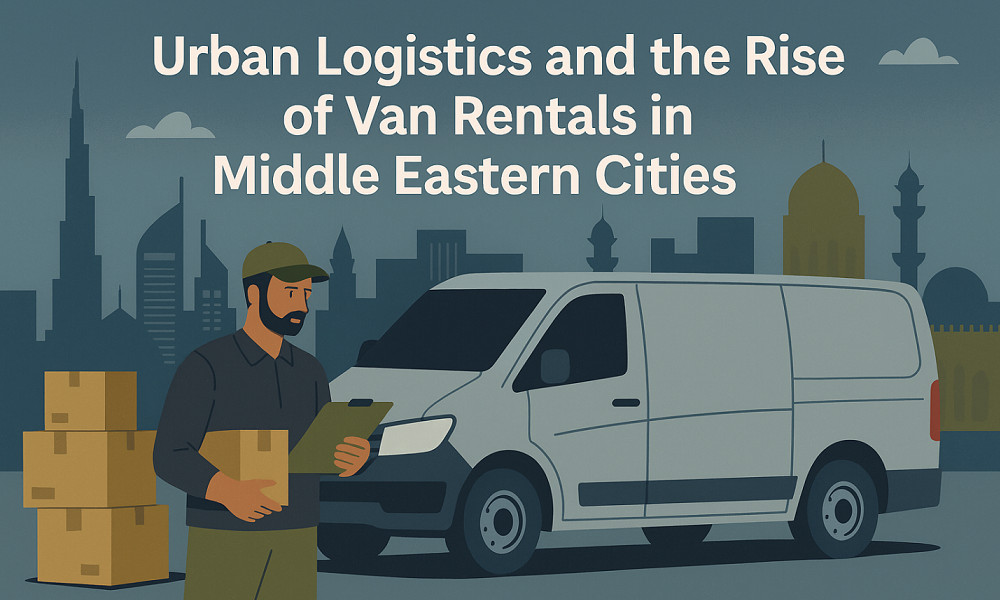Reviews
Urban Logistics and the Rise of Van Rentals in Middle Eastern Cities

Urban logistics in the Middle East is undergoing rapid change. As online shopping becomes the norm, cities like Dubai, Riyadh, and Cairo face surging last-mile delivery demand that strains traditional transport networks. In response, many businesses are turning to van rental services as a flexible way to expand delivery capacity without maintaining large fleets. Renting vans on demand allows companies to handle spikes in orders without the burden of owning and managing extra vehicles year-round.
Van Rental Services Reshaping Urban Logistics
Van rentals have emerged as a key pillar of urban logistics across the region. Rather than buying delivery trucks, retailers and courier firms increasingly rent cargo vans to scale up operations quickly when needed. According to industry experts at Octane Rent (https://octane.rent/van-car-rental-dubai/), a leading car rental platform in the UAE, businesses overwhelmingly prefer short-term van rentals over purchasing fleets, citing flexibility and cost efficiency as the main advantages. Globally, the van rental market is expanding rapidly, reflecting a broad shift toward flexible transportation solutions. One major driver of this trend is the Middle East’s e-commerce boom – as online sales surge, companies rent vehicles to handle the jump in shipments.
Crucially, renting vans gives logistics providers agility. For peak seasons or promotions, businesses can bring in extra vans for a short period and then release them, avoiding idle capacity during slower times. Analysts note that during such order spikes, van rentals are an attractive choice because they add capacity without the long-term costs of ownership. In Dubai and Riyadh, for example, delivery companies routinely lease additional vans during major shopping events to ensure all orders are fulfilled. Meanwhile, in Cairo, smaller e-commerce operators hire vans to navigate the city’s congested streets for deliveries without having to buy their own vehicles. Notably, van rentals also lower the barrier to entry for independent couriers and small businesses. A new delivery startup or a local shop can simply rent a van when needed instead of buying one, which reduces upfront costs and risks. This accessibility means more players can participate in last-mile delivery, further fueling the demand for rental services.
Urban conditions also favor vans over larger trucks. Dense neighborhoods and heavy traffic make big trucks impractical for many city deliveries. Vans hit a middle ground – they carry more packages than a car or bike but can still maneuver through narrow streets and tight parking spaces. As congestion and limited parking persist, companies prefer smaller delivery vehicles that can navigate city centers more easily. This practicality is another reason rental vans are in high demand for final-mile logistics in busy downtown areas.

Shifting Consumer Behavior and Last-Mile Delivery Demands
The rise of van rentals is directly tied to shifting consumer behavior, particularly the e-commerce boom in the Middle East. The region’s online retail market has expanded from about $30 billion in 2022 to a projected $50 billion by 2025. This rapid growth means a dramatic increase in the volume of parcels moving through city streets each day. Consumers now expect quick, convenient delivery for anything from electronics to groceries, putting pressure on retailers to fulfill orders with minimal delay. That, in turn, makes last-mile delivery one of the most challenging steps for logistics providers. Recent global events have further reinforced these patterns – for example, the COVID-19 pandemic pushed many consumers toward online shopping out of necessity, permanently elevating the baseline of e-commerce demand.
Notably, e-commerce now drives roughly 40% of logistics demand in MENA, and last-mile fulfillment can account for up to 53% of total shipping costs. This underscores how resource-intensive the final delivery stage is. In Dubai, high customer expectations for speed force couriers to run multiple delivery rounds per day; in Riyadh, the sprawling city layout requires careful route coordination; and in Cairo, chronic traffic congestion makes meeting delivery times a daily challenge. Every extra van or bike dispatched adds to traffic and cost, but it is often necessary to maintain the service levels that online shoppers demand.
To cope with soaring demand, companies are investing in better route planning and setting up local urban warehouses to shorten delivery distances. Even so, the basic need remains the same: more vehicles and drivers to reach customers quickly. This is where van rentals prove invaluable. They allow businesses to bridge the gap between surging order volumes and fixed fleet capacity by adding vans when needed and dropping them when not. This elasticity helps companies stay responsive to fluctuating buying patterns without over-committing resources.
Government and Urban Planning Responses
City governments and urban planners in the Middle East are responding to the logistical pressures of e-commerce with both investments and new policies. One major step has been investing in logistics infrastructure. Governments are funding new distribution parks, better roads, and expanded warehousing to facilitate smoother movement of goods. Saudi Arabia and the UAE, for instance, have developed large distribution zones and improved highway networks to help delivery vehicles operate more efficiently. By bolstering infrastructure in this way, officials aim to prevent bottlenecks as delivery volumes grow.
Authorities are also adjusting regulations to manage the delivery boom. Some cities have designated curbside loading zones and are encouraging off-peak deliveries to reduce daytime traffic. A key focus is promoting sustainable last-mile solutions. For example, Dubai’s RTA is pushing delivery firms to adopt electric bikes by simplifying e-bike licensing requirements – a move intended to cut down the number of vans on the road and curb emissions. Across the region, there is also a gradual push for cleaner vehicle fleets (including electric vans), often supported by government incentives aligned with environmental goals.
Governments are further partnering with the private sector to spur innovation in urban logistics. Pilot programs for drone deliveries, autonomous vehicles, and smart traffic systems are being explored to increase efficiency. National development plans across several countries emphasize digital infrastructure and smart-city initiatives, which indirectly support e-commerce logistics. In Egypt, for instance, authorities backed the launch of Jumia’s massive Cairo logistics hub as part of a broader digital economy drive. Such collaborations show that policymakers see value in nurturing the logistics sector while mitigating its urban side effects.

The Road Ahead: Flexible Logistics for a Rapidly Urbanizing Middle East
The rise of van rentals has become a crucial element in the evolution of urban logistics in Middle Eastern cities. It offers businesses a flexible tool to meet booming delivery demand without over-investing in assets, and it helps ensure that consumers continue to enjoy fast delivery services. Going forward, last-mile delivery needs are expected to keep climbing steeply (projected to surge by around 78% globally by 2030), which means adaptable solutions like rented vans will remain in high demand.
In the coming years, rental fleets will likely incorporate more electric vehicles and smarter fleet-management technologies to boost efficiency and sustainability. At the same time, ongoing infrastructure upgrades and supportive policies from governments will be key to preventing logistics growth from overwhelming city streets. For businesses and policymakers alike, the challenge ahead is to keep innovating together – leveraging flexible logistics solutions while building smarter cities that can handle the ever-growing flow of goods and services in the digital age. In sum, the synergy between van rentals and urban logistics will continue to deepen. By staying agile and embracing innovation, Middle Eastern cities can keep goods moving efficiently in the digital age while working to minimize congestion and environmental impacts.

-

 World3 days ago
World3 days agoEthiopian volcano erupts for first time in thousands of years
-

 Legal1 week ago
Legal1 week agoMichigan man JD Vance sentenced to 2 years for threatening Trump and JD Vance
-

 Legal1 week ago
Legal1 week agoWoman in critical condition after being set on fire on Chicago train
-

 World1 week ago
World1 week agoHurricane Melissa registered 252 mph wind gust, breaking global record
-

 Legal6 days ago
Legal6 days agoSuspect in San Diego stabbing shot by authorities after fleeing into Mexico
-

 Legal1 week ago
Legal1 week ago1 dead, 2 injured in shooting at Dallas Walmart parking lot
-

 Health6 days ago
Health6 days agoMarburg virus outbreak in Ethiopia grows to 6 confirmed cases
-

 Legal4 hours ago
Legal4 hours agoUtah Amber Alert: Jessika Francisco abducted by sex offender in Ogden




